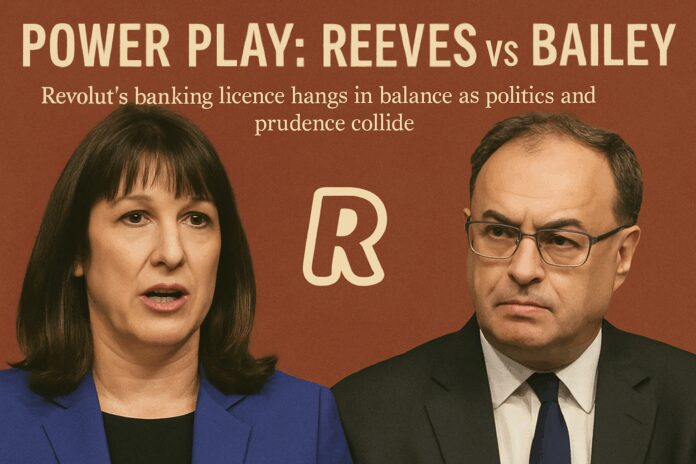Can the UK be a fintech powerhouse without bending the rules? That’s the question at the heart of a growing rift between Britain’s new Chancellor, Rachel Reeves, and Bank of England Governor Andrew Bailey — and the battleground is none other than Revolut, the UK’s most valuable fintech.
Despite finally securing a UK banking licence last year, Revolut remains stuck in “mobilisation mode” — effectively frozen in place. Reeves wants to fast-track the process. Bailey says: not so fast.
What Triggered the Standoff?
- The meeting that never happened. Earlier this month, Reeves requested a joint session with Revolut, the Treasury, and the Bank of England’s Prudential Regulation Authority (PRA) to remove any remaining obstacles to full licensing.
- Bailey intervened. The Bank’s governor personally canceled the meeting, arguing it would compromise the Bank’s regulatory independence — a hard line that’s held since the 2008 crisis.
Revolut’s Licence Limbo
- The company finally received its UK banking licence on 25 July 2024 after years of delay.
- But a full year later, it’s still stuck in “mobilisation,” with a deposit cap of just £50,000 total.
- According to PRA insiders, Revolut hasn’t yet met key requirements, including robust internal controls and clean financial reporting.
Clash of Priorities: Growth vs. Prudence
| Topic | Rachel Reeves | Andrew Bailey |
|---|---|---|
| Fintech growth | Revolut is a global fintech leader. Supporting it shows London is open for innovation and IPOs. | All firms must meet the same standards. Scaling too fast without safeguards is a risk. |
| Regulatory reform | Reeves’ “Leeds Reforms” aim to accelerate approvals and reduce red tape. | Post-crisis reforms exist for a reason. Weakening them could erode trust. |
| IPO concerns | Losing Revolut to a New York listing would damage the UK’s fintech credibility. | The PRA’s timeline isn’t dictated by IPO pressure — only by risk readiness. |
What’s Holding Revolut Back?
- Tech infrastructure – Regulators want proof that its core banking systems can scale securely.
- Financial crime controls – A €3.5 million AML-related fine in Lithuania raised compliance concerns.
- Audit history – Its 2023 accounts received qualified opinions. UK regulators want stronger financial governance before lifting restrictions.
What Happens Next?
- Revolut is looking abroad — including a potential acquisition of a US community bank to fast-track American licensing.
- Reeves will unveil the full “Leeds Reforms” legislation this autumn. If it includes ministerial override powers, tensions with the Bank could resurface.
- The PRA still holds the final say. While 2025 was originally expected for full approval, insiders now suggest early 2026 is more likely.
The Bottom Line
Reeves wants to show the world that the UK is serious about fintech and growth.
Bailey wants to ensure the system remains stable and credible.
At stake is more than just a banking licence — it’s the future direction of financial regulation in post-Brexit Britain.




